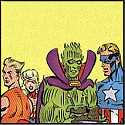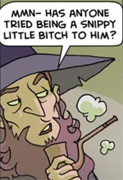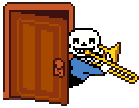|
Not gonna lie, this is a dumbass argument. Here, let me lay down some truths: - First, all of the arguments below are predicated on this poo poo being a luxury good. This is not someone's medication being withheld, no child will miss a meal because someone charged a dollar for a short story, no one will be sleeping in the rain because DTRPG is charging for a DW class. - People wanting to be paid for things is not "wrong", you are free to charge whatever you like and be paid whatever you like. - You can not pay. Get this, just like Fenarisk states he is not OWED anything from people, he is also not entitled to their poo poo for free. They don't owe you poo poo either, buddy, regardless of how good you think it is or not. - It ain't your job to tell other people what their poo poo is worth, except in that you are free to pay it or not. Odds are good if you are unwilling to pay for their poo poo, they could give a gently caress. - There is plenty of poo poo out there free, right now. We are drowning in it. You could masturbate to a different piece of Harry Potter pornography once a day for the next thirty years and never pay a dime for any of it. This still doesn't entitle you to other peoples work. Holy poo poo this is dumb, if someone charges money for something, good on 'em. I wish them well of it. If you don't want to give them money? Don't.
|
|
|
|

|
| # ? Apr 28, 2024 20:34 |
|
I guess it's more of a personal thing, the same way I don't think tip jars should exist for people just doing their jobs at Subway or Starbucks and I don't think someone doing less than a professional level job should be compensated, and it's for that reason anything I put out that isn't a lengthy or extreme effort project gets put out for free. It probably makes me an rear end for having unrealistic expectations so I will concede.
|
|
|
|
Fenarisk posted:I guess it's more of a personal thing, the same way I don't think tip jars should exist for people just doing their jobs at Subway or Starbucks and I don't think someone doing less than a professional level job should be compensated. It probably makes me an rear end for having unrealistic expectations so I will concede. Then don't tip at Subway or Starbucks? This poo poo isn't hard. Most people don't. Sometimes someone is exceptionally nice or does something exceptionally good, and they get tipped. If this starts the tipping convo in here I swear to god I will lay the boots to people however.
|
|
|
|
Fenarisk posted:but the guy selling his lovely non professional playbooks on DTRPG shouldn't even be close to a reality, yet it is. Would you care to clarify what makes playbooks that someone is selling "non-professional?" Because the actual definition of "professional" (as in "professional sports") is "you make money from this." Or are you actually saying that only established game designers should be allowed to charge money for stuff they make, and that established game designers actually spawn fully-formed from the æther?
|
|
|
|
Lemon Curdistan posted:Would you care to clarify what makes playbooks that someone is selling "non-professional?" Because the actual definition of "professional" (as in "professional sports") is "you make money from this." I meant more quality layout, art, balanced mechanics, play testing, and originality. The average person can do this with time and effort if they put the time and effort in, as opposed to slapping some poo poo together and throwing it up for sale. Maybe my real argument was on the quality and I just don't know what I'm arguing!
|
|
|
|
Pumpkin_Paine posted:Not gonna lie, this is a dumbass argument. It really just boils down to the usual "X is getting worse... and it's happening all the time!" Chicken Little argument that rarely holds any water. RPGs are awesomer and cheaper than they ever have been. I remember when there was no such thing as a free RPG save homebrew stuff literally shared around a gaming table. It used to be writing material for somebody else's game was a good way to get sued if you tried to distribute it widely in any sense. Trying to pretend there was some golden age of RPG auteurs is weird, since we're living in it right now.
|
|
|
|
Alien rope burn made a good point and I think part of it is me seeing my youth through rose colored glasses in the days of learning and seeing all this new AD&D stuff online between bouts of Diablo 2, while ignoring professional publishing companies years later making GBS threads out 3e products like their lives depended on it. That and I have some punk and his parents threatening to use for me on the kindle marketplace over his lovely 99 cent short story that uses the same title as my novel. So really what I'm saying is sorry for being an idiot posting at work.
|
|
|
|
Alien Rope Burn posted:It really just boils down to the usual "X is getting worse... and it's happening all the time!" Chicken Little argument that rarely holds any water. RPGs are awesomer and cheaper than they ever have been. I remember when there was no such thing as a free RPG save homebrew stuff literally shared around a gaming table. It used to be writing material for somebody else's game was a good way to get sued if you tried to distribute it widely in any sense. Trying to pretend there was some golden age of RPG auteurs is weird, since we're living in it right now. Didn't TSR even actively go after people putting up homebrew online in the 90's or something? Stuff like that's hard to believe in comparison to how things are now.
|
|
|
|
01011001 posted:Didn't TSR even actively go after people putting up homebrew online in the 90's or something? Stuff like that's hard to believe in comparison to how things are now. Yes, yes they did. Part of that was people weren't just sharing homebrew, they were sharing entire rulebooks online (text only, for the most part, but the art back then wasn't worth downloading anyway) and TSR's lawyers didn't make any sort of distinction between 'this is fan made content' and 'this is our content'.
|
|
|
|
01011001 posted:Didn't TSR even actively go after people putting up homebrew online in the 90's or something? Stuff like that's hard to believe in comparison to how things are now. Yeah. Companies like TSR, Palladium, Games Workshop, and Steve Jackson Games have been notorious about that sort of thing in the past. Kwyndig posted:Yes, yes they did. Part of that was people weren't just sharing homebrew, they were sharing entire rulebooks online (text only, for the most part, but the art back then wasn't worth downloading anyway) and TSR's lawyers didn't make any sort of distinction between 'this is fan made content' and 'this is our content'. I remember one widespread compilation of AD&D 2e material just used fantasy porn on the "cover" instead. 
|
|
|
|
Mikan posted:Monte Cook announced what is probably the worst license terms I've seen in a long time. If you don't have the chops to negotiate a better agreement with the man himself and expect to gross chump change, the license tells you how exactly you can gently caress off. This is not all bad, though not all good. It's kind of Not Great to have a license that squeeze some cash out of the segment least likely to have a viable business plan--and "I'm gonna gross $2000 and they'll let me on panels and poo poo!" is not a good business plan. On the other hand, it protects Numenera from a bunch of long tail pamphlet releases--they apparently don't want that, and it's in their right to control it. Finally, it's specifically not a fan policy. Basically, if a WotC alumnus wants to use Numenera's system for a major project, s/he's going to sidestep this license completely and negotiate something different. MalcolmSheppard fucked around with this message at 02:50 on Oct 9, 2013 |
|
|
|
Wasn't there some legal case where you couldnt copyright game mechanics because it was ruled there were only so many ways to make a randomized chance of something happening or something? Or is that just something for OverheardInTheGamestore.txt?
|
|
|
|
MisterShine posted:Wasn't there some legal case where you couldnt copyright game mechanics because it was ruled there were only so many ways to make a randomized chance of something happening or something? Hoo boy: 0) I am not a lawyer but my understanding is: 1) Game mechanics cannot be copyrighted (http://www.copyright.gov/fls/fl108.html). 2) Expressions of game mechanics can. So d20+mod to hit DC can't be copyrighted, but that phrase can, and maybe the term DC could be protected. 3) Trademark is a separate thing, but see 4. 4) *However*, C&Ds routinely cite copyright and trademark violations whether or not both are actually in play (example: Hasbro's action against the producers of what was Scrabulous claimed trademark over game systems, not just names and trade dress). Companies routinely assert trademark over systems, even though this is a Maybe Not True. 5) Some companies have floated the notion that game systems are copyrightable by way of analogy with software copyrights, in that numeric values can be copyrighted. I have never read about this being tested. Ryan Dancey has made this claim (specifically with respect to OSRIC) so who knows? 6) I suspect that the thing actually enforcing customs around using systems is the resource disparity between companies with popular intellectual properties and everyone else. If you are not yourself an intellectual property lawyer or can't get one for free, Hasbro's ability to annoy you exists regardless of the merits of the action.
|
|
|
|
MisterShine posted:Wasn't there some legal case where you couldnt copyright game mechanics because it was ruled there were only so many ways to make a randomized chance of something happening or something? http://www.copyright.gov/fls/fl108.html I don't know if its the result of a legal case, but this seems to say one cannot copyright game mechanics. Of course, that doesn't stop companies from asserting they can sue and C&D the competition out of the market. Not saying they do, but I wouldn't be shocked if some did. US Gov't on Copyright Law in Regards to Games posted:Copyright does not protect the idea for a game, its name or title, or the method or methods for playing it. Nor does copyright protect any idea, system, method, device, or trademark material involved in developing, merchandising, or playing a game. Once a game has been made public, nothing in the copyright law prevents others from developing another game based on similar principles. Copyright protects only the particular manner of an author’s expression in literary, artistic, or musical form. As for Mikan a few post back pointing out we don't have a good source for reviews, I really couldn't agree more. So many reviewers are so bias and unprofessional its nigh impossible to know if a game is actually good or not before purchasing. Its sort of off-putting for a person like me who loves researching the hell out of a product before buying. I mean, I'd been throwing around the idea of trying to get some gamers who have some prior journalist experience to actually try professionally reviewing some games. You know, have them play with their friends for at least three sessions before giving their thoughts on how the mechanics work in play. Try to keep it R.A.W. so the review is actually honest. And, for that matter, them actually play the game and not just read the book before discussing it. But, honestly, no one is going to do that for free. Not to mention the scheduling issues and the fact most releases aren't worth talking about. Or, hell, the cost of buying the games. Still, it would be nice to have trustworthy reviews. Edit: Eh, this kind of came off as more of a rant than I wanted it to.
|
|
|
|
The internet gave them a wider audience, and e-publishing lowered the barrier of entry but people have been producing crappy unpolished game products and expecting people to pay for them since the hobby began.There is much more good high quality free content available for tabletop gamers today then there ever was prior to the internet.
|
|
|
|
Also not a lawyer, but wouldn't patent law be more applicable here than copyright law? Patents tend to cover protection of working ideas and methods. Copyright is more protection of specific sections of quoted words, musical passages, etc. Patenting is more flexible in what it can apply to, but it expires a lot faster than copyright. I believe this describes Garfield's patenting of a lot of Magic: The Gathering mechanics, for example. To me, that says that specific game mechanics can be patented. Of course, in the end, it's all down to what's arguable in court.
|
|
|
|
Iris of Ether posted:Also not a lawyer, but wouldn't patent law be more applicable here than copyright law? Patents tend to cover protection of working ideas and methods. Copyright is more protection of specific sections of quoted words, musical passages, etc. Patenting is more flexible in what it can apply to, but it expires a lot faster than copyright. Thing is that for WotC or Palladium to try and sue for patent infringement, they must first have their patent approved by the Patent office. That might be a hard thing to pull off considering the nature of these games. I mean, a card game requires physical products that, ideally, only the legal distributors design and produce. One can patent how the cards themselves are laid out and in what manner they are produced and what materials they are made with. What I'm getting at here is that I feel any patent application for D&D and other tabletop rpgs would probably be denied since the product is essentially a book. A book with mechanics written within, but, still, just a book. If they sold it in a game box with dice, map tiles, a series of power cards, etc., then it might get approved. Covok fucked around with this message at 04:00 on Oct 9, 2013 |
|
|
|
At least as laid out on the website the Numenera license is just kind of badly written. Even if we set aside concerns about the content, they managed to make it really vague on several key points. They do actually have a "fan use policy" so they explicitly won't come after you for posting stuff on your website, though it's kind of bizarre to me that the license page doesn't link to the fan use policy page. Plus the fan use policy page has a word count an order of magnitude greater, and clarifies tons of potential questions. But to me the bigger issue with the license is simply that if you're a current or aspiring game publisher, the Numenera license has basically nothing to offer over the many other open systems you can use for free. I've heard good things about Numenera overall, but if I decide I want to use an existing system, right off the bad I have d20/Pathfinder, Fudge, Fate, Savage Worlds, Open D6, etc. available to me for free, several of which have a much more proven track record. Bucnasti posted:The internet gave them a wider audience, and e-publishing lowered the barrier of entry but people have been producing crappy unpolished game products and expecting people to pay for them since the hobby began.There is much more good high quality free content available for tabletop gamers today then there ever was prior to the internet.
|
|
|
|
Iris of Ether posted:Also not a lawyer, but wouldn't patent law be more applicable here than copyright law? Patents tend to cover protection of working ideas and methods. Copyright is more protection of specific sections of quoted words, musical passages, etc. Patenting is more flexible in what it can apply to, but it expires a lot faster than copyright. The issue really at hand is that patent law only applies to novel, patented inventions. Richard Garfield owned the patent on Magic: The Gathering because it was the first (known, published) game of its kind. Good luck convincing anybody in a patent court that rolling a d20 (commonly produced by a variety of companies and first produced over 2000 years ago) and comparing it to a number is a new and never before seen game mechanic... Well, it's not going to work.
|
|
|
|
Iris of Ether posted:Also not a lawyer, but wouldn't patent law be more applicable here than copyright law? Patents tend to cover protection of working ideas and methods. Copyright is more protection of specific sections of quoted words, musical passages, etc. Patenting is more flexible in what it can apply to, but it expires a lot faster than copyright. I agree; inasmuch as software patents are legitimate, they're protecting "systems" and that's what patents are for. Theoretically a game company could apply for a patent of the game system. However: -Patents are supposed to be fairly simple. You don't patent an entire car; you patent your novel design for a torque converter. Even fairly complicated systems like an entire automatic transmission is probably too complicated to patent all in one go. -Patents are expensive. At least, they're very expensive compared to copyright (which is free), and trademark (which is pretty cheap). Applying for a patent requires a lot of legal prep-work, patents have to be written out and prepared in very formalized and careful ways, and you have to do your research on prior art and show that your system isn't already patented, and/or that you're not attempting to patent something that's already been made by someone else. -Patents don't last very long. Copyright is good till 70 years after the death of the creator (thanks in no small part to Disney lobbying congress to ensure Mickey can't ever become public domain), but patents are generally only good for 20 years. That might seem like a long time, but (for example) not only would a D&D patent have expired by now, so would a Palladium system patent, the earliest Games Workshop Warhammer patents, most classic board games, etc. -Patents take a long time to process. You can claim "patent pending" and go ahead and start trading on your patent, but there's a legal risk (if someone challenges your patent in court, for example, or if it's rejected). -There's not much precedent for patenting trad game systems, so it's likely that a lot of money and time and effort could be spent in the attempt, just to have the patent application rejected One of the unique things about game systems is that they don't actually do anything. Rather, they lay out rules for people to follow in order to entertain themselves. Software patents always accomplish work of some kind: they have inputs and outputs, and the middle bit is done by the system, in some kind of automated way. I think you could certainly make an argument that (say) the system behind the board game RISK "does" something, in that you roll some dice, consult the System, and it tells you whether your armies won or died. But actually it's up to you to decide to remove the armies from the board or not, so really all you're doing is following instructions... and "instructions" are not patentable. I can patent a new design of torque converter, but I can't patent a diagram of the torque converter and claim that the patent is of the diagram, rather than the system described by the diagram. So then we come to this: Iris of Ether posted:I believe this describes Garfield's patenting of a lot of Magic: The Gathering mechanics, for example. To me, that says that specific game mechanics can be patented. And that's it exactly. It's actually not that hard to get patent; the patent office will give you the patent if it does not find a pre-existing patent that you're infringing, and if the patent is valid on its face (it's written out correctly the way they want it written, etc.) But what really matters is when the patent is challenged by someone. At that point, the patent has to be defended by its owner, and to a much more rigorous standard than the patent office applied when it first granted the patent. This is why corporations usually have very carefully proscribed rules for their R&D departments; you keep track of every last scrap of work that goes into developing your widget, including notebooks with dated & signed pages in some cases, so that you can prove in court in a patent challenge that you really did develop the widget yourself from first principles (rather than by copying someone else's patented prior art and then making insignificant changes). Garfield's patents may be totally bullshit, but we won't know until/unless someone decides to challenge them, and the challenge doesn't wind up getting settled out of court (or dropped). A full-blown patent challenge can be ruinously expensive and last for several years, so it's almost never in the interests of either party to drag it out to a full conclusion. What is much more common is that Company A has a bunch of patents it sits on, tons of other companies do stuff that skirts the fringes of those patents, and then Company A sues an infringing company only if they're direct competitor, loaded, or both. Usually the result of their lawsuit is that either Company A gets an undisclosed fat check from Company B (along with a license to use the patented thing), or Company A eventually drops the suit (to avoid the risk of their patent possibly being overturned entirely by a judge). Another common result is that Company B goes out of business, because they can't afford the legal fees to fight Company A, and can't continue doing business without selling the key products that Company A is asserting infringe their patent. So... TL:DR, yeah maybe patents but for practical reasons the vast majority of game companies should not seriously consider bothering with it. The copyrightable intellectual property is probably more valuable anyway, and vastly cheaper and easier to protect.
|
|
|
|
The legalities of the whole thing are a bit academic, because nobody's been willing to go into the ring with a game company as far as I'm aware. They don't need to necessarily be legally sound, they just need to be able to intimidate hobbyists into backing down. And if that doesn't work, they just need to do the same to their webhost or the like. I've always been curious as to whether or not these companies would actually drag a customer into court, but it hasn't happened to the best of my knowledge.Ewen Cluney posted:But to me the bigger issue with the license is simply that if you're a current or aspiring game publisher, the Numenera license has basically nothing to offer over the many other open systems you can use for free. To be fair, part of the thing is that you're also getting access to the Numenera setting, which is a slightly different deal. With the video game coming out someday, the interest in the setting might explode, or it might tumble, people might be indifferent to it, it's a gamble. Monte Cook is a pretty fierce self-promoter - I mean, look how well-known he is despite not having a lot under his name that could be termed "exceptional". He has a lot of interesting material to his name, but there's no game I could point do and say Monte Cook did GAME X, no game that feels influential or groundbreaking. Yes, there's D&D 3e, but his contributions have gotten tremendously outweighed by those of his peers. And yet he's a big name because he's basically pushed his name so hard people started believing he was a big name. I mean, what games did he have his name all over before Numenera? Oh, right, Call of Cthulhu d20. I think I got off my point somewhere but basically it's an investment in Monte Cook's self-imposed fame more than a system or even a setting.
|
|
|
|
Wait, really? I haven't been in the scene all that long and I just assumed that whatever 90's schlock Monte put out back in the 90's was considered innovative for its time. How did he get his fame, then? Writing for one of the D&D magazines or something?
|
|
|
|
Alien Rope Burn posted:I mean, what games did he have his name all over before Numenera? I think Iron Heroes was all right. Enough to justify the fame by itself? Nah, but it was a decent game.
|
|
|
|
Jimbozig posted:Wait, really? I haven't been in the scene all that long and I just assumed that whatever 90's schlock Monte put out back in the 90's was considered innovative for its time. How did he get his fame, then? Writing for one of the D&D magazines or something? Monte Cook is really good at making sure his name gets on the front of the book.
|
|
|
|
MONTE COOK'S WORLD OF DARKNESS (sucked).
|
|
|
|
Triple-Kan posted:Monte Cook is really good at making sure his name gets on the front of the book.
|
|
|
|
Ewen Cluney posted:But to me the bigger issue with the license is simply that if you're a current or aspiring game publisher, the Numenera license has basically nothing to offer over the many other open systems you can use for free. I've heard good things about Numenera overall, but if I decide I want to use an existing system, right off the bad I have d20/Pathfinder, Fudge, Fate, Savage Worlds, Open D6, etc. available to me for free, several of which have a much more proven track record. This is what I'm taking from it as well. There's something about this that almost seems worse than just not putting out a public license at all. Plenty of games don't have licenses to allow you to use their systems, and that's all well and good. If Monte Cook feels he needs to protect the system or that it's a key part of the game's market value- so he can't just give it away to anyone to make copies- hey, that's valid. Instead he seems to think it's good enough that people will pay to use it?
|
|
|
|
Jimbozig posted:Wait, really? I haven't been in the scene all that long and I just assumed that whatever 90's schlock Monte put out back in the 90's was considered innovative for its time. How did he get his fame, then? Writing for one of the D&D magazines or something? He wrote modules and Planescape supplements during the 90's.
|
|
|
|
Honestly, I've never seen him as all that great a game designer. He's much better at coming up with interesting and compelling settings. I backed Numenera purely for the setting, with no expectation for the game mechanics.
|
|
|
|
I have the strangest urge to buy a Numenera license and write the worst officially licensed supplement of all time.
|
|
|
|
neongrey posted:I think Iron Heroes was all right. Enough to justify the fame by itself? Nah, but it was a decent game. Iron Heroes was Mike Mearls. It was published under Monte Cook's Malhavoc brand, which may be where there confusion comes from. Jimbozig posted:Wait, really? I haven't been in the scene all that long and I just assumed that whatever 90's schlock Monte put out back in the 90's was considered innovative for its time. How did he get his fame, then? Writing for one of the D&D magazines or something? Mostly, he wrote for AD&D, and then got a big boost by writing the Dungeon Masters Guide for 3e. The really, really smart move he made was almost immediately jumping ship from WotC afterwards and spinning his five minutes of fame into founding Malhavoc Press, which was them published by White Wolf. He was smart in putting his name on the cover of every book he wrote for it to associate the Malhavoc brand with not only himself, but as a designer that had worked on 3e. Malhavoc thusly not only had a head-start on other d20 brands (after all, it had one of the designers working on it), but also gave it psuedo-legitimacy that no other d20 brand had. After all, he put out a book called Arcana Unearthed that had absolutely nothing to do with Unearthed Arcana, and nobody seemed to blink an eye at his blatant brand-nabbing. He also continued to do freelance work for D&D 3e, the most notable being Book of the Vile Darkness, which got him a fair amount of additional exposure due to its deliberately baiting controversiality, and also put nipple clamps of exquisite pain into the gamer lexicon. JackMann posted:Honestly, I've never seen him as all that great a game designer. He's much better at coming up with interesting and compelling settings. I backed Numenera purely for the setting, with no expectation for the game mechanics. He made it big being the biggest name in d20 outside of WotC, but he's mainly known for making settings instead of games - Ghostwalk, Arcana Evolved, and Plotus being the main examples. Alien Rope Burn fucked around with this message at 13:55 on Oct 9, 2013 |
|
|
|
He also did some work that went into the Rolemaster Companions of the 80's, which were kind enough to individually attribute each section on the credits page.Alien Rope Burn posted:Iron Heroes was Mike Mearls. It was published under Monte Cook's Malhavoc brand, which may be where there confusion comes from. Well, that and also this is the logo:  That whole "presents" thing has been a pretty big boost to what a lot of people imagine is Monte's prolific writing.
|
|
|
|
To be fair on the Arcana Unearthed bit, apparently he'd worked it out with WotC beforehand. Originally, it was going to be called Unearthed Arcana. Then WotC decided they wanted to put out their own Unearthed Arcana book, and he had to switch it around.
|
|
|
|
Halloween Jack posted:He's the Ryan Dancey of being the Steve Jobs of book covers. His "some work for ICE and AD&D" was actually as a full time editor and designer for Iron Crown (Covering RM and HERO) and then TSR, which means he had a hand in a vast number of D&D and other TSR books for a very long time.
|
|
|
|
MalcolmSheppard posted:His "some work for ICE and AD&D" was actually as a full time editor and designer for Iron Crown (Covering RM and HERO) and then TSR, which means he had a hand in a vast number of D&D and other TSR books for a very long time. By "vast" he means about 15 or so, but yes. It's true Monte Cook has had a long career in the gaming industry. But he made his name big based on his 3e and d20 work. Relatively few folks remember him for his work on Rolemaster Companion V, Windriders of the Jagged Cliffs, or Champions in 3-D. At most, Planescape fans will know him pretty well for having a big mark on that line, but for both good and ill. Ultimately, though, his Malhavoc work dwarfs his TSR contributions. JackMann posted:To be fair on the Arcana Unearthed bit, apparently he'd worked it out with WotC beforehand. Originally, it was going to be called Unearthed Arcana. Then WotC decided they wanted to put out their own Unearthed Arcana book, and he had to switch it around. Of course he did - he'd have a decent risk of getting sued, otherwise! I still find it shady for him to try and use the name recognition of Unearthed Arcana to market an entirely unrelated product, though. Alien Rope Burn fucked around with this message at 04:52 on Oct 10, 2013 |
|
|
|
Alien Rope Burn posted:By "vast" he means about 15 or so, but yes. It's true Monte Cook has had a long career in the gaming industry. But he made his name big based on his 3e and d20 work. Relatively few folks remember him for his work on Rolemaster Companion V, Windriders of the Jagged Cliffs, or Champions in 3-D. At most, Planescape fans will know him pretty well for having a big mark on that line, but for both good and ill. Ultimately, though, his Malhavoc work dwarfs his TSR contributions. Generally when you work for a company full time, it means that every product under your purview passes over your desk. He was the editor in charge of Hero and RM from the late 80s to the early 90s (http://www.rpg.net/columns/briefhistory/briefhistory8.phtml), so he worked on pretty much everything released from that company, not just what you might turn up with some Googling. (And now I miss the old pen-paper.net, which wasn't too bad about recording creator credits.) I seriously doubt he has no more than 15 TSR credits (RPGnet's listings are incomplete, and list maybe 18, not including a few dozen Dragon Magazine articles). The rest of this sounds like "Surely nothing notable was done in the field before the existence of web forums!" Okay, I get that you don't like the way he designs games, but he was an extremely experienced writer, editor and designer before he was involved in D&D, and didn't get momentum to do his own thing purely out of a sense of entitlement.
|
|
|
|
I think it's relevant that Malhavoc made the first well-produced third party d20 supplements. There is a big advantage to being there early with something good. Around here d20 is not really treasured but it was insanely popular and Malhavoc was actually pretty aggressive and had some solid stuff. People are saying "oh it's just Malhavoc" but it was a good drat run.
|
|
|
|
Well, d20 design is painfully incremental most of the time. Sometimes this is just lazy tweak-and-it's-done, but not always. I like Arcana Unearthed's fighter replacements and leveled races, for example, because beyond sheer novelty, they addressed issues in core D&D play. All the same, it's not the kind of thing that's going to wow people either.
|
|
|
|
The whole concept of marketing designers like rock stars - yes, that was seriously how they phrased it - was born at Wizards of the Coast. Skip Williams and Monte Cook were lead poster boys for that project. The end result was that most fans hated Skip for his "Sage Advice" column personally as opposed to as a more abstract figure, and Monte Cook just kept doing it because it seemed to work, and ended up competing with D&D's brand. That's why they downplayed that strategy considerably as time went on. As for Monte's design credit, I'll credit him for designing a full game when he stops copying the drat D&D spell list for every product he puts out and just tweaking it upwards or downwards.
|
|
|
|

|
| # ? Apr 28, 2024 20:34 |
|
MalcolmSheppard posted:Generally when you work for a company full time, it means that every product under your purview passes over your desk. He was the editor in charge of Hero and RM from the late 80s to the early 90s (http://www.rpg.net/columns/briefhistory/briefhistory8.phtml), so he worked on pretty much everything released from that company, not just what you might turn up with some Googling. (And now I miss the old pen-paper.net, which wasn't too bad about recording creator credits.) I seriously doubt he has no more than 15 TSR credits (RPGnet's listings are incomplete, and list maybe 18, not including a few dozen Dragon Magazine articles). I'm sure there's more to it than the credits pages and my collection is incomplete, but the earliest credit for him in Rolemaster that I can find is 1989. His first regular ICE Staff credit is in 1991, his last credit in any Rolemaster book is 1994 as RM2 came to a close. So he was an author/developer/editor on a few RM books around 1989-1990, then became the line editor as RM2 wound down with its last ~10 books. quote:The rest of this sounds like "Surely nothing notable was done in the field before the existence of web forums!" Okay, I get that you don't like the way he designs games, but he was an extremely experienced writer, editor and designer before he was involved in D&D, and didn't get momentum to do his own thing purely out of a sense of entitlement. I don't think that's really what this is about. It's more of an eyeroll at the whole situation than some kind of resentment. That Old Tree fucked around with this message at 08:52 on Oct 10, 2013 |
|
|

































